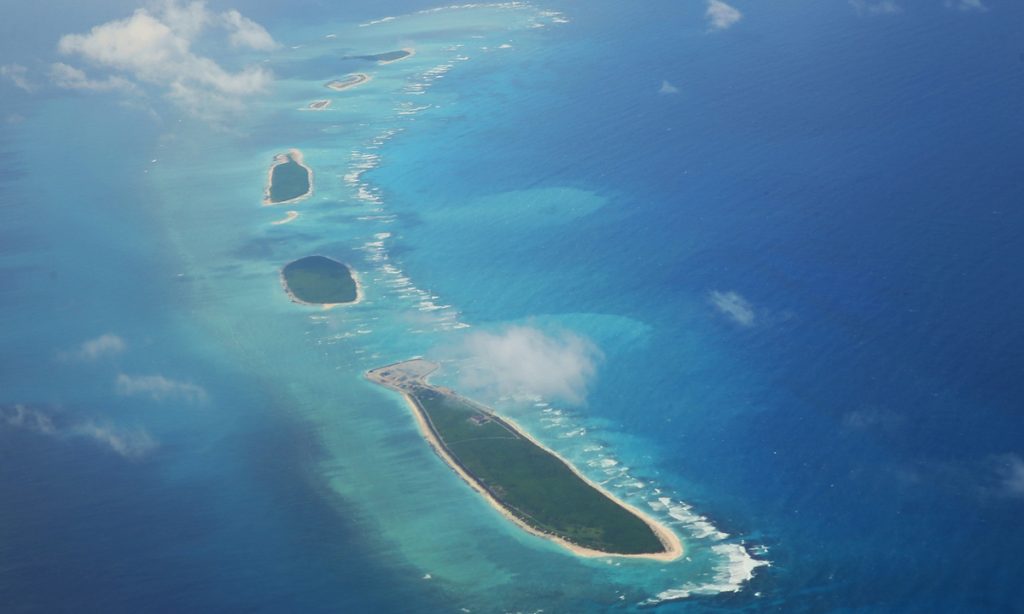US to build boat maintenance facilities for Philippines; move ‘may make new waves in SCS’

The US Navy will construct two military boat maintenance facilities in Palawan, a Philippine province facing the South China Sea, the Associated Press reported. Chinese experts said the move has clear military implications and could further provoke tension in the region.
The US Embassy in Manila announced on Wednesday that the US Navy plans to build a new boat maintenance facility to help repair Philippine military vessels at the Naval Detachment Oyster Base in Ulugan Bay, Palawan. "The US Naval Facilities Engineering Systems Command has formally issued a public solicitation for the design and construction of the project on July 7," acting embassy spokesperson Glenda Wallace said in a statement, according to the Philippine News Agency.
USNI News, a media outlet affiliated with the US Naval Institute, reported that a solicitation for the other boat maintenance facility seeks to construct support infrastructure to host Philippine vessels in the municipality of Quezon, located only 257 kilometers east of China's Ren'ai Jiao. Project documents highlighted the site's strategic location in the South China Sea as one of the key objectives.
According to the USNI News report, the facility is expected to support at least five vessels, with documents specifying rigid-hulled inflatable boats and "assault boats." The report noted that several of these vessels were seen at a handover ceremony to the Armed Forces of the Philippines Western Command, the force responsible for operations in the South China Sea.
USNI News also noted that the construction requirements are similar to those set forth under another construction initiative planned for Oyster Bay, which is also expected to accommodate unmanned surface vessels of the Philippine Navy.
The report further stated that despite sea states and distances, Philippine forces have frequently deployed small boats into disputed waters. Plans for the project seek to get the watercraft from the facility and into the water within 15 minutes to meet a "rapid deployment readiness" objective.
Although Wallace attempt to emphasize that "the boat maintenance facility is not a military base" and stated that "the project is approved by the government of the Philippines in accordance with all applicable US and Philippine local rules and regulations," experts remain skeptical.
Wallace claimed that the facility would provide repair and maintenance capabilities for several small Philippine military watercraft and will include two multi-purpose interior rooms suitable for equipment storage or conference use, as reported by the Philippine News Agency.
Chinese experts voiced concerns over the potential implications of the facility. "With Washington's support, the Philippines may adopt new tactics in its provocative actions in the South China Sea," Zhang Junshe, a Chinese military affairs expert, told the Global Times on Thursday.
Zhang warned that by highlighting the role of small boats, the US and the Philippines may attempt to employ "wolf pack strategy" involving multiple vessels to harass larger Chinese ships. He added that this approach could also serve as a psychological operation aimed at portraying the Philippines as the victim and falsely accusing China of "bullying the weak," thereby generating a new wave of unrest in the South China Sea.
While the tactical role of small vessels is limited due to China's superior naval countermeasures, the political symbol of this support from the US outweighs its military utility, Zhang said.
Chen Xiangmiao, a research fellow at the National Institute for South China Sea Studies, echoed these concerns, telling the Global Times that building a boat maintenance facility near the South China Sea carries "obvious military implications" and may serve as a platform for expanding US military presence in the region. He noted that the project could embolden Philippine military adventurism and escalate confrontations with China in the South China Sea, as it provides a low-cost model of external support.
Amid the ongoing tensions in the South China Sea, on Tuesday morning, Philippine Coast Guard vessel 9701, operating in the waters near China's Huangyan Dao in the South China Sea, deliberately provoked China Coast Guard (CCG) vessels 21550 and 5009, which were conducting rights protection and law enforcement operations in the area.
The vessel repeatedly conducted high-speed transits through the stern areas of China Coast Guard law enforcement vessels while dangerously approaching them, with the closest distance being only some 100 meters. This act seriously threatened the navigation safety of the CCG vessels.
"Recent provocations by the Philippines are becoming increasingly reckless," Zhang said. He noted that recent US-Philippine coordination has emboldened Manila's attempts of provoking China over the South China Sea issue. "But China has a wide range of countermeasures and will not yield on territorial sovereignty. These new tactics by the Philippines will not succeed."